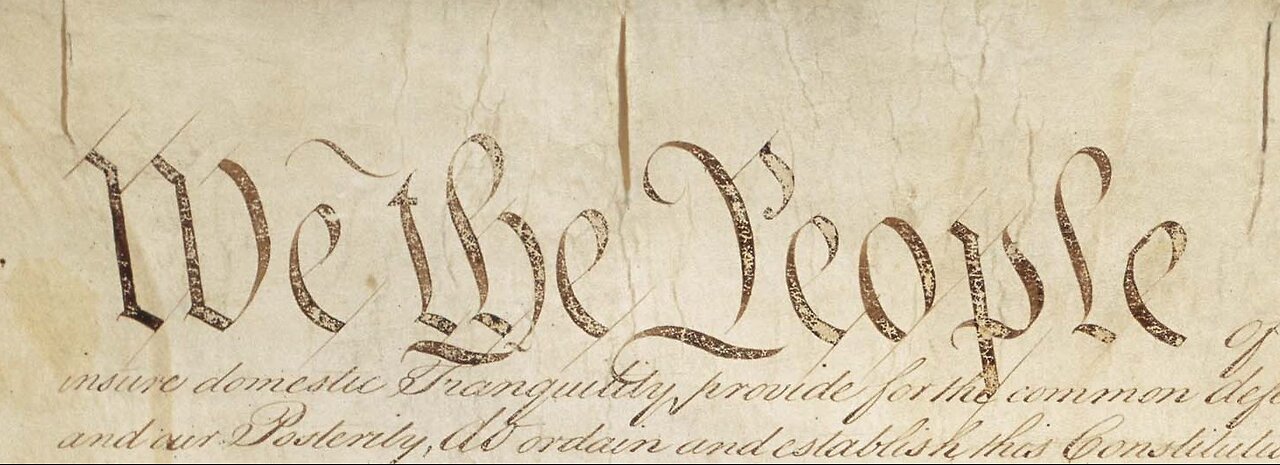Premium Only Content

We the People! All Rights Reserved.
#sovereigncitizen <——-(oxymoron) #Americannational #Statenationals #Statemen #lawful #WethePeople #involuntary-servitude
w/o Prejudice w/o Recourse. All Rights Reserved.
The Supreme Court attempts to deflect such criticism by relying on history as justification for its decisions recognizing certain unenumerated rights. For example, the Fifth and Fourteenth Amendments to the U.S. Constitution prohibit the government from depriving any person of life, liberty, or property without “due process of law. Reasonable Expectation of Privacy Individuals receive no Fourth Amendment protection unless they can demonstrate that they have a reasonable expectation of privacy in the place that was searched or the property that was seized. The U.S. Supreme Court explained that what “a person knowingly exposes to the public, even in his own home or office, is not a subject of Fourth Amendment protection…. But what he seeks to preserve as private, even in an area accessible to the public, may be constitutionally protected.” Katz v. United States, 389 U.S. 347, 88 S. Ct. 507, 19 L. Ed. 2d 576 (1976).
These influences threaten the very framework of our society.
The U.S. Constitution The highest law in the United States is the U.S. Constitution. No state or federal law may contradict any provision in the Constitution. In a sense the federal Constitution is a collection of inviolable statutes. It can be altered only by amendment. Amendments pass after they are approved by two-thirds of both houses of Congress or after petition by two-thirds of the state legislatures. Amendments are then ratified by three-fourths of the state legislatures or by conventions in three-fourths of the states. Upon ratification, the amendment becomes part of the Constitution. Beneath the federal Constitution lies a vast body of other laws, including federal statutes, treaties, court decisions, agency regulations, and executive orders, and state constitutions, statutes, court decisions, agency regulations, and executive orders. Statutes and Treaties After the federal Constitution, the highest laws are written laws, or statutes, passed by elected federal lawmakers. States have their own constitution and statutes. Federal laws generally involve matters that concern the entire country. State laws generally do not reach beyond the borders of the state. Under Article VI, Section 2, of the U.S. Constitution, federal laws have supremacy over state and local laws. This means that when a state or local law conflicts with a federal law, the federal law prevails.
He who spares the guilty, punishes the innocent. [Mark 15:6-15, Luke 23:17-25, John 18:38-40
Usury is odious in law. [Exodus 22:25, Leviticus 25:3637, Nehemiah 5:7,10, Proverbs 28:8, Ezekiel 18:8,13,17; 22:12]
• Impossibility excuses the law
• If you judge, understand.
• Many men know many things, no one knows everything.
• One is not present unless he understands.
• Consent makes the law. A contract is a law between the parties, which can acquire force only by consent.
• Consent makes the law: the terms of a contract, lawful in its purpose, constitute the law as between the parties.
• To him consenting no injury is done.
• He who consents cannot receive an injury.
• Consent removes or obviates a mistake.
Copyright disclaimer under Section 107 of the Copyright Act This video is for educational and entertainment purposes only. I do not own any of the clips or music used in this video. All rights belong to their respective owners. This video falls under the fair use doctrine of the U.S. Copyright Act of 1976, which allows for limited use of copyrighted material for purposes such as criticism, comment, news reporting, teaching, scholarship, and research.
Non-Domestic/Non-Assumpsit
8 U.S.C § 1104(a)(1); 1408; 1503; 1182;
12 U.S.C § 531;
15 U.S.C § § 1; 2; 18a;
22 U.S.C § § 1741; 254d;
26 U.S.C § 6013(g);
28 U.S.C § 1746(1); 18 U.S.C § 1621(2); 2 FAM 232.1-1
-
 LIVE
LIVE
Revenge of the Cis
2 hours agoEpisode 1442: Conservative TM
2,398 watching -
 UPCOMING
UPCOMING
Game On!
3 hours ago5 Biggest Super Bowl BET Mistakes You Might Be Making
1341 -
 UPCOMING
UPCOMING
BlackDiamondGunsandGear
2 hours agoTOP 5 CCW / Whats your Favorite? #EDC
89 -
 1:02:21
1:02:21
In The Litter Box w/ Jewels & Catturd
22 hours agoSCHUMER ENDORSES DOGE | In the Litter Box w/ Jewels & Catturd – Ep. 736 – 2/6/2025
31.2K22 -
 1:06:12
1:06:12
Dr. Drew
4 hours agoFrance: Woke Politics Pioneers Now REJECT Le Wokisme... WTF Changed? w/ Beatrice Rosen (The Dark Knight) – Ask Dr. Drew
26.6K -
 1:48:54
1:48:54
The Quartering
4 hours agoUSAID Debacle Gets WORSE, Taxpayers Funded Gamergate, Kash Patel Delayed & Mass Elon Protests!
59.3K25 -
 1:17:05
1:17:05
Right Side Broadcasting Network
6 hours agoLIVE REPLAY: President Trump Signs Executive Orders - 2/6/25
71.7K32 -
 LIVE
LIVE
G2G Gaming Channel
7 hours agoHelmet Day! Hope i dont need goggles too! #RumbleGaming
181 watching -
 LIVE
LIVE
Barry Cunningham
3 hours agoTRUMP DAILY BRIEFING: PRESIDENT TRUMP, ELON MUSK, AND KASH PATEL HAVE THE DEMS FREAKING OUT!
1,875 watching -
 1:58:03
1:58:03
The Charlie Kirk Show
4 hours agoTrump the Promise-Keeper + The New White House Press Corps | Gaines, Davis, Leavitt | 2.6.2025
133K31